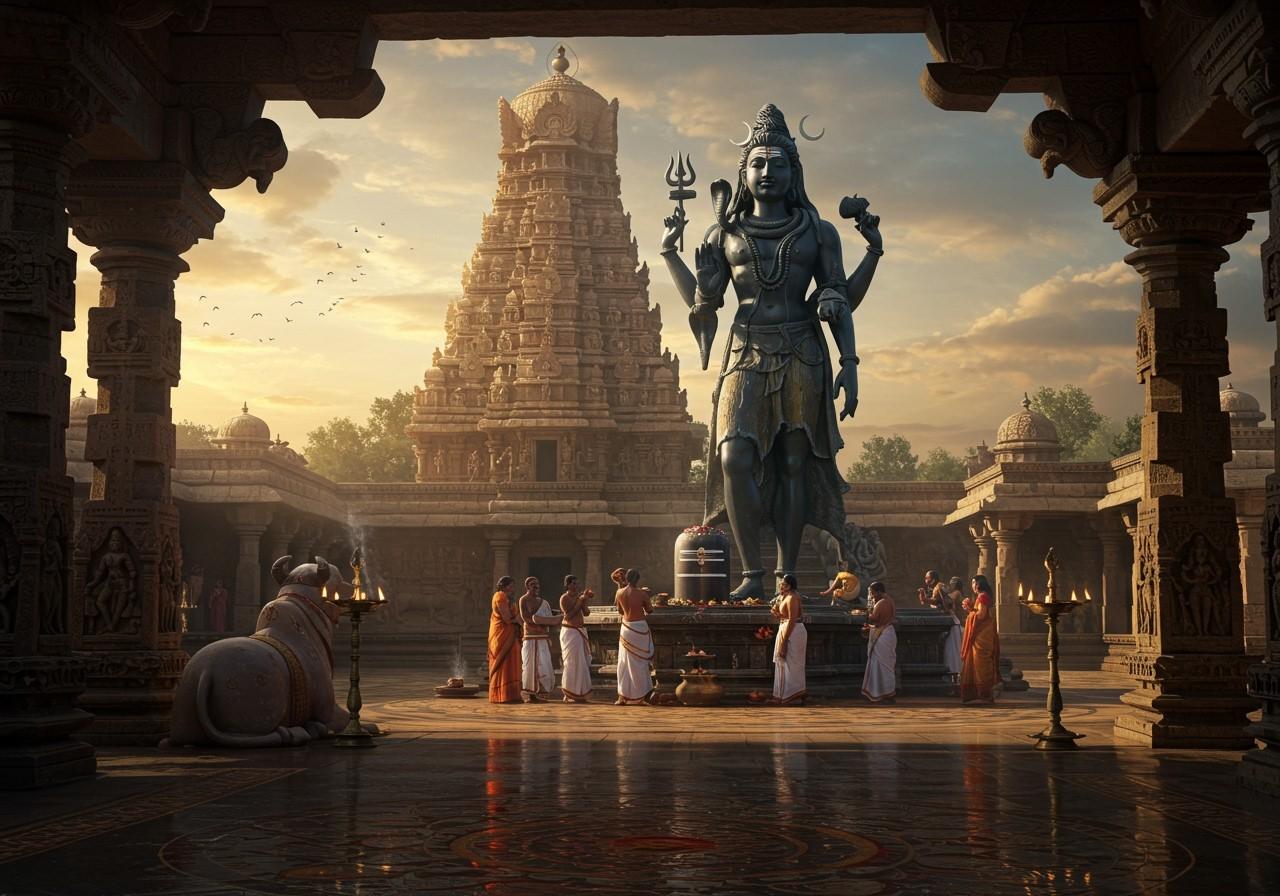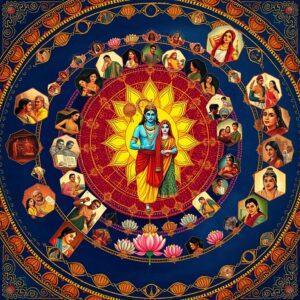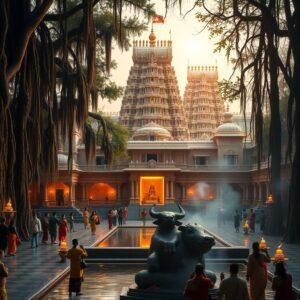
Nestled in the heart of Haveri, Karnataka, the Siddhesvara Mahadeva Temple invites you on a spiritual voyage. This guide delves into the temple’s captivating history, the sacred rituals performed within its walls, and its profound significance in Hindu worship. Discover why this divine sanctuary draws culturally rooted Indians who value tradition and spirituality, seeking blessings and participating in authentic rituals.
A Glimpse into History
Established during the Chalukyan era, the Siddhesvara Mahadeva Temple showcases the architectural influences of the period. Its intricate carvings and detailed sculptures speak volumes about the craftsmanship of that time. Over the centuries, this temple has evolved into a central hub for religious and cultural gatherings. Historical records and inscriptions emphasize its importance in the region’s history, with various dynasties contributing to its prosperity and preservation.
An Architectural Marvel
The Siddhesvara Temple, also known as Purada Siddeshwara, stands as a testament to 12th-century Western Chalukyan artistry. Constructed from soapstone, the temple exhibits a timeless appeal, reflecting the era’s grandeur through its intricate carvings and sculptures. This material not only enhances the temple’s aesthetic beauty but also contributes to its enduring strength.
The temple features a garbhagriha (sanctum sanctorum) and a mandapa (pillared hall) for devotees to congregate for prayers. Each element plays a role in guiding visitors on a spiritual path. The vimana, or tower above the sanctum, symbolizes the link between the earthly and the divine.
Unique carvings of deities and mythological scenes adorn the temple walls, showcasing the artisans’ skill and devotion. These masterpieces narrate ancient stories, bringing them to life for contemporary worshippers.
Originally a Vaishnava temple before its conversion to a Shiva temple, the Siddhesvara Temple reflects the region’s evolving spiritual landscape. Despite these changes, it has remained a cherished place for devotion and spiritual pursuits.
Rituals and Practices
Rituals form the heart of daily life within the Siddhesvara Mahadeva Temple. Each ceremony holds deep meaning for devotees. Abhisheka, the ritual bathing of the deity, is believed to purify the spirit and bring worshippers closer to divine blessings.
Festivals, especially Maha Shivaratri, attract large gatherings, filling the temple with energy and devotion. Priests guide worshippers through the rituals, ensuring traditions are observed with reverence and authenticity. Offerings such as bilva leaves and rudraksha beads hold special significance in Shiva worship, believed to please Lord Shiva and bring blessings of prosperity and peace.
The Temple’s Significance
The Siddhesvara Mahadeva Temple serves as a spiritual center for Shiva devotees, offering solace and guidance. It also functions as a community hub, hosting cultural events that unite people in shared traditions.
Legends and folklore woven around the temple enrich its history, adding layers of meaning and influencing local customs. Pilgrims from all over India visit this sacred site, drawn by its spiritual and historical importance.
Visitor Information
The ideal time to visit is during early mornings or festival days to experience the vibrant atmosphere. Respectful attire and behavior are essential within the temple premises. Visitors are encouraged to immerse themselves in the experience with an open heart.
Nearby attractions offer further opportunities to explore the region’s rich culture, including local cuisine and guided tours that provide deeper insights into the temple’s history and significance.
How Poojn.in Supports Devotees
Poojn.in offers a wide selection of puja items essential for worship at the Siddhesvara Mahadeva Temple. Given Lord Shiva’s prominence, we provide authentic ritual items such as:
- Pure copper kalash for abhishekam: Our kalash are crafted with high-quality copper, ideal for performing the sacred abhishekam ritual. They come in various sizes to suit individual needs.
- Bilva leaves and garlands: Freshly sourced and carefully packaged, our bilva leaves and garlands retain their sanctity and fragrance, perfect for offering to Lord Shiva.
- Traditional dhoop and deep items: We offer a variety of traditional dhoop and deep items, including incense sticks, agarbatti, and wicks, to create a sacred ambiance during puja.
- Panchamrit ingredients: Our panchamrit sets include all five essential ingredients (milk, yogurt, honey, ghee, and sugar) of the highest quality, ensuring a pure and auspicious offering.
- Pure ghee for deepam: Sourced from trusted dairies, our pure ghee is ideal for lighting lamps and performing aarti, enhancing the spiritual atmosphere.
- Rudraksha malas: We offer genuine rudraksha malas in different mukhi counts, known for their spiritual significance and benefits for meditation and prayer.
- White cloth for offering: Clean and pure white cloth pieces are available in various sizes, suitable for offering to the deity and spreading on the altar.
- Pure silver items for worship: Elevate your puja with our collection of pure silver items, including plates, bowls, and diyas, adding a touch of elegance and purity to your rituals.
Our products are packaged securely to preserve their purity during transit and are delivered across India with utmost care. Each product listing provides details about its ritual significance and proper usage. For those planning temple visits, our pre-assembled Shiva puja kits offer convenience and ensure you have everything needed for the rituals. Visit www.poojn.in to explore our complete range of Shiva puja items. Our customer service team can assist you in selecting the right products based on specific temple customs.
Embracing the Spiritual Journey
A visit to the Siddhesvara Mahadeva Temple is a profound experience, connecting you with tradition and spirituality. This sacred site offers a unique blend of architectural beauty, rich rituals, and deep significance, guiding devotees on a path of devotion and reflection. Whether you seek historical insights or spiritual solace, the temple provides a space to connect with the divine. As you walk through its ancient halls, you become part of a timeless tradition, experiencing the enduring legacy of the divine.
FAQs
What is the history of Siddhesvara Mahadeva Temple? The Siddhesvara Mahadeva Temple, also known as Purada Siddeshwara, located in Haveri, Karnataka, is an ornate example of 12th-century Western Chalukyan art. Originally consecrated in the late 11th century as a Vaishnava temple, it was later converted to a Shiva temple. It’s renowned for its loose sculptures of Hindu deities and its soapstone construction, similar to other Chalukyan temples in the region.
Why is Siddhesvara Mahadeva Temple significant? This temple holds deep spiritual significance for Shiva worshippers, offering a place for solace, divine intervention, and guidance. It also serves as a community center, hosting cultural events and uniting people through shared traditions. Its historical importance and the legends associated with it further enhance its significance.
What rituals are performed at Siddhesvara Mahadeva Temple? Abhisheka, the ritual bathing of the deity, is a central practice. Offerings of bilva leaves and rudraksha are common. Festivals like Maha Shivaratri are celebrated with special fervor and draw large congregations.
Can visitors participate in the rituals? Yes, visitors are welcome to participate in the rituals and seek blessings, which can deepen their spiritual connection.
When is the best time to visit? Early mornings or festival days offer the most vibrant atmosphere for a visit.
Are there nearby attractions? Yes, several cultural and historical sites near the temple provide opportunities to explore the region’s rich heritage.
How can I reach the temple? The temple is well-connected by road and accessible by car or public transport. Consulting local guides or maps can provide accurate directions.
Suryanarayana Temples in Karnataka
Is there an entry fee? Generally, there is no entry fee, but donations are welcome and contribute to the temple’s upkeep.


